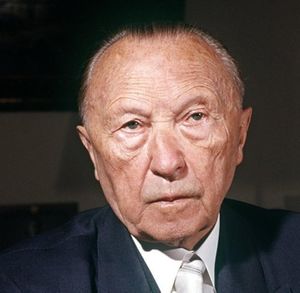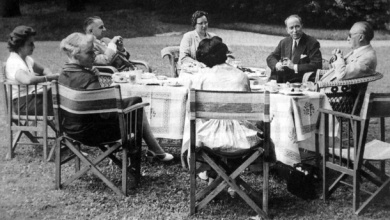Difference between revisions of "Konrad Adenauer"
("number one on the White List") |
(family ties) |
||
| Line 47: | Line 47: | ||
Adenauer was Mayor of [[Cologne]] during the occupation of the Rheinland after [[World War 1]]. While most of the region was allocated to the French, the most important city in the region, Cologne, was allocated to the British. Adenauer was part of the movement that instigated the move to independence for the region, a movement heavily supported by the French.<ref>https://www.preussenchronik.de/ereignis_jsp/key=chronologie_009900.html</ref> The British were hostile to this separatism. Adenauer hedged his allegiance, and did not support the vote to declare the region independent.<ref>https://lefroggydotcom.wordpress.com/2015/05/11/frances-policies-against-germany-after-the-first-world-war/</ref> In October 1923, Adenauer opened talks with the French High Commissioner [[Paul Tirard]] for a Rhenish republic in a sort of economic union with France.<ref>Epstein, Klaus (October 1967). [https://doi.org/10.1017%2Fs0034670500040614 "Adenauer and Rhenish Separatism"]. The Review of Politics. 29 (4): p542.</ref> | Adenauer was Mayor of [[Cologne]] during the occupation of the Rheinland after [[World War 1]]. While most of the region was allocated to the French, the most important city in the region, Cologne, was allocated to the British. Adenauer was part of the movement that instigated the move to independence for the region, a movement heavily supported by the French.<ref>https://www.preussenchronik.de/ereignis_jsp/key=chronologie_009900.html</ref> The British were hostile to this separatism. Adenauer hedged his allegiance, and did not support the vote to declare the region independent.<ref>https://lefroggydotcom.wordpress.com/2015/05/11/frances-policies-against-germany-after-the-first-world-war/</ref> In October 1923, Adenauer opened talks with the French High Commissioner [[Paul Tirard]] for a Rhenish republic in a sort of economic union with France.<ref>Epstein, Klaus (October 1967). [https://doi.org/10.1017%2Fs0034670500040614 "Adenauer and Rhenish Separatism"]. The Review of Politics. 29 (4): p542.</ref> | ||
| + | |||
| + | ==Family== | ||
| + | Adenauer married [[Auguste Zinsser]], of the US-German chemical industrialist family.<ref name=letter>https://theamericanscholar.org/a-cousin-from-cologne/</ref> | ||
| + | |||
| + | [[John J. McCloy]], who became the proconsul over occupied Germany after 1945, was the husband of the former Ellen Zinsser, of the same family. So it happened that the two men who collaborated most closely on the creation of the new Germany were Zinsser relatives.<ref name=letter/><ref>https://mises.org/mises-daily/rockefeller-morgan-and-war</ref> | ||
==After World War 2== | ==After World War 2== | ||
Latest revision as of 01:12, 1 October 2024
(politician) | |
|---|---|
 | |
| Born | Konrad Hermann Joseph Adenauer 1876-01-05 Cologne, German Empire |
| Died | 1967-04-19 (Age 91) Bad Honnef, West Germany |
| Nationality | German |
| Alma mater | University of Freiburg, University of Munich, University of Bonn |
| Religion | Roman Catholicism |
| Children | 8 |
| Spouse | Emma Weyer |
| Member of | Knights of Malta, Le Cercle |
| Party | Centre Party (Germany), Christian Democratic Union |
Konrad Adenauer was a German politician, and probably also deep politician.
Contents
Rhineland separatism
One reason just Adenauer was selected to be Chancellor of West Germany of West Germany after World War 2 may lie in him possibly becoming a British asset after World War 1.
Adenauer was Mayor of Cologne during the occupation of the Rheinland after World War 1. While most of the region was allocated to the French, the most important city in the region, Cologne, was allocated to the British. Adenauer was part of the movement that instigated the move to independence for the region, a movement heavily supported by the French.[1] The British were hostile to this separatism. Adenauer hedged his allegiance, and did not support the vote to declare the region independent.[2] In October 1923, Adenauer opened talks with the French High Commissioner Paul Tirard for a Rhenish republic in a sort of economic union with France.[3]
Family
Adenauer married Auguste Zinsser, of the US-German chemical industrialist family.[4]
John J. McCloy, who became the proconsul over occupied Germany after 1945, was the husband of the former Ellen Zinsser, of the same family. So it happened that the two men who collaborated most closely on the creation of the new Germany were Zinsser relatives.[4][5]
After World War 2
A US military document date 8 May 1945 identifies him as being "number one on the White List for Germany".[6]
The American intelligence officer Lawrence de Neufville stated that he had already helped "with the preparation for the Adenauer government" already in 1948.[7]
Connections

Adenauer was the oldest known visitor to Le Cercle, and may have been an important person in its early years.
Events Participated in
| Event | Start | End | Location(s) | Description |
|---|---|---|---|---|
| 1948 Hague Congress | 7 May 1948 | 11 May 1948 | Netherlands The Hague | Landmark conference which had a profound influence on the shape of the European Movement. Many of the groups organizing the conference received covert funding from the CIA. |
| Le Cercle/1958 | 18 August 1958 | 18 August 1958 | Europe | Exact dates uncertain |
References
- ↑ https://www.preussenchronik.de/ereignis_jsp/key=chronologie_009900.html
- ↑ https://lefroggydotcom.wordpress.com/2015/05/11/frances-policies-against-germany-after-the-first-world-war/
- ↑ Epstein, Klaus (October 1967). "Adenauer and Rhenish Separatism". The Review of Politics. 29 (4): p542.
- ↑ a b https://theamericanscholar.org/a-cousin-from-cologne/
- ↑ https://mises.org/mises-daily/rockefeller-morgan-and-war
- ↑ https://web.archive.org/web/20220624192148/https://adenauerhaus.de/downloads/Exponat_des_Monats/ExpMai13.pdf
- ↑ https://www.telepolis.de/features/Der-lange-Schatten-der-Alliierten-Deutschlands-Souveraenitaet-im-Wandel-9782513.html